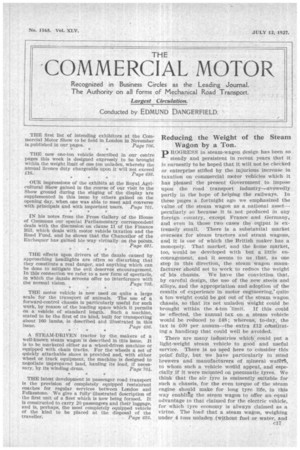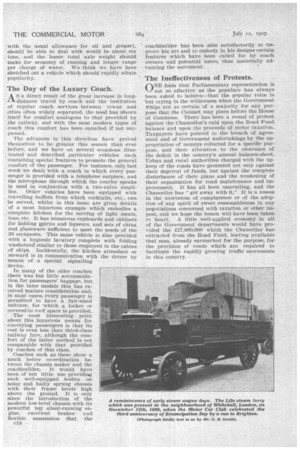Reducing the Weight of the Steam Wagon by a Ton.
Page 39

Page 40

If you've noticed an error in this article please click here to report it so we can fix it.
p ROGRESS in steam-wagon design has been so steady and persistent in recent years that it Is earnestly to be hoped that it will not be checked or enterprise stifled by the injurious increase in taxation on .commercial motor vehicles which it has pleased the present Government to impose upon the road transport industry—avowedly partly in the hope of helping the railways. In these pages a fortnight ago we emphasized the value of the steam wagon as a national asset— peculiarly so because it is not produced in any foreign country, except France and Germany, and even in those two cases the oudtput is extremely small. There is a substantial market overseas for steam tractors and steam wagons, and it is one of which the British maker has a monopoly. That market, and the home market, too, would be developed with but a little encouragement, and it seems to us that, as one step in this direction, the steam wagon manufacturer should set to work to reduce the weight of his chassis. We have the conviction that, by careful design, the use of the new steels and alloys, and the appropriation and adoption of the results of experience in motor engineering, quite a ton weight could be got out of the steam wagon chassis, so that its net unladen. Weight could be brought within the 4-ton 'limit. If this could be effected, the annual tax on a steam vehicle would be reduced to £48; whereas, to-day, the tax is £0 per annum—the extra £12 cdnstitutlug a handicap that could well be avoided.
There are many industries which. could put a light-weight steam vehicle to good and useful service. There is no need here to cOnsider this Point fully, but we have particularly in mind brewers and manufacturers of mineral watt3A, to whom such a vehicle woald appeal, and especially if it were mounted on pneumatic tyres. We think that the air tyre is eminently suitable for such a chassis, for the even torque of the steam engine should make for long tyre life, in this way enabling the steam wagon to offer an equal advantage to that claimed for the electric vehicle, for which tyre economy is always claimed as a virtue. The load that a steam wagon, weighing under 4 tons unladen (without fuel or water, and with the usual allowance for, oil and grease), should be able to deal with would be about six tons, • and the lesser total axle weight should make for economy of running and longer range per charge of water. We think we have here sketched out a vehicle which should rapidly attain popularity.
The Day of the Luxury Coach.
A S a direct result of the great increase in long-LA-distance travel by coach and the institution of regular coach services between towns and cities often widely separated, the need has shown Itself for comfort analogous to that provided by the railway, and with the most modern types of -coach this comfort has been equalled if not surpassed.
The advances in this direction have proved themselves to be greater this season than ever before, and we have on several occasions illustrated and described particular vehicles each containing special features to promote the general comfort of the passenger. For instance, only last week we dealt with a coach in which every passenger is provided with a telephone earpiece, and the microphone through which the courier speaks is used in conjunction with a two-valve amplifier. Other vehicles have been equipped with . travelling buffets from which cocktails, etc., can be served, whilst in this issue are given details of a most luxul'ious example which embodies a complete kitchen for the serving of light meals, teas, etc. It has numerous cupboards and cabinets for holding spirits and liqueurs, and sets of china and glassware sufficient to meet the needs of the 20 occupants. This same vehicle is also provided with a hygienic lavatory complete with folding washstand similarto those employed in the cabins of ships. Incidentally, the kitchen attendant or steward is in communication with the driver by means of a special signalling device.
In many of the older coaches there was but little accommodation for passengers' baggage, but in the later models this has received mature consideration and, in most cases, every passenger is permitted to have a fair-sized suitcase, for 'which a locker or covered-in roof space is provided. The most interesting point about this luxurious means for conveying passengers is that its cost is even less than third-class railway fare, although the comfort of the latter method is not comparable with that provided by coaches of this class.
Coaches such as these show a much better co-ordination between the chassis maker and the coachbuilder. It would have been of but little use providing such well-equipped bodies on noisy and badly sprung chassis with their frame levels high above the ground. It is only since the introduction of the modern low-level chassis, with its powerful but silent-running engine, excellent brakes and flexible suspension that the c3.8 coachbuilder has been able satisfactorily to improve his art and to embody in his designs certain features which have been called for by coach owners and potential users, thus materially ad vancing the movement. • The Ineffectiveness of Protests.
ONE feels that Parliamentary representation is not so effective as the populace has always been asked to believe—that the popular voice is -but crying in the wilderness when the Government Whips are so certain of a majority for any purpose that the Cabinet may place before the House of Commons. There has been a round of protest against the Chancellor's raid upon the Road Fund balance and upon the proceeds of motor taxation. Taxpayers have pointed to the breach of agreement and of Government undertakings by the appropriation of moneys collected for a specific purpose, and their allocation to the clearance of the deficit in the country's annual balance-sheet. Urban and rural authorities charged with the upkeep of the roads have protested not only against their deprival of funds, but against the complete disturbance of their plans and the weakening of their organisation for road maintenance and improvement. It has all been unavailing, and the Chancellor has "got away with it." It is a lesson in the unWisdom of complacence or of the adoption of any spirit of sweet reasonableness in any negotiations concerned with taxation or other impost, and we hope the lesson will have been taken to heart. A little well-applied economy in all of the Government departments would have provided the £27,000,000 which the Chancellor has extracted from the Road Fund, leaving available that sum, already earmarked for the purpose, for the provision of roads which are required to facilitate the rapidly growing traffic movements in this country.












































































































